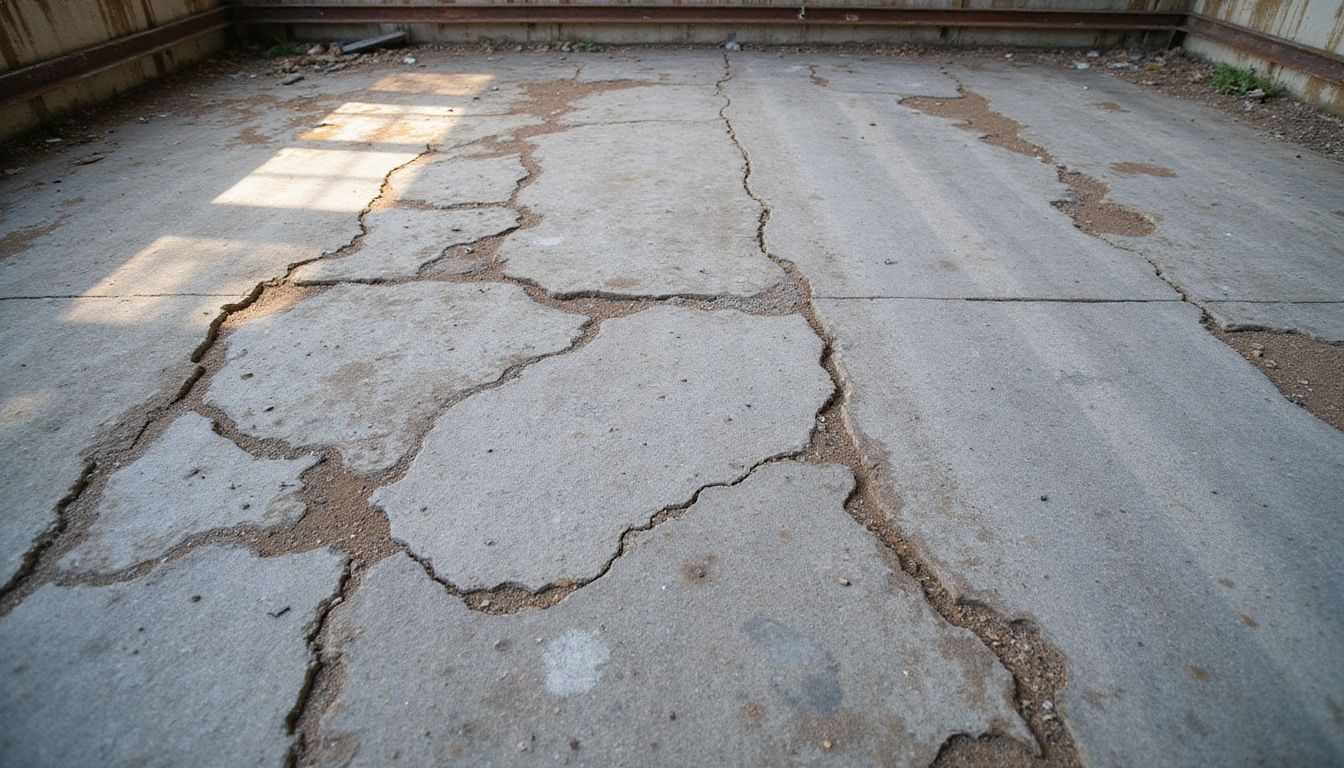Become an Installer

Have you noticed cracks or stains on your concrete driveway and wondered why they keep getting worse? Unsealed concrete has a 50% higher chance of developing serious cracks over time.
Problems with Unsealed Concrete
Unsealed concrete faces serious risks from water and chemicals. These elements can damage the surface and weaken its structure over time.
Cracking and Spalling
Unprotected concrete faces a harsh reality with cracking and spalling as major threats. Studies show that unsealed concrete carries a 50% higher risk of developing severe cracks over time.
These cracks form from environmental stress and temperature changes, weakening the surface. Spalling, where chunks of concrete break off, often follows as the damage worsens. This deterioration exposes the inner structure to further harm.
Moisture plays a cruel role in this process. Untreated concrete, being highly porous, lets water seep in, triggering frost damage during cold weather. This absorbed moisture can also cause pitting and scaling on surfaces like a concrete driveway.
Applying a concrete sealer, such as a penetrating damp protector, shields the material from these destructive forces. Sealing boosts resistance to freezing and thawing cycles, preserving the integrity of masonry and block paving.
Staining from Liquids and Chemicals
Unsealed concrete faces a high risk of staining from liquids and chemicals. Its porous nature allows substances like oil, grease, and harsh solvents to seep deep into the surface. This penetration causes permanent discoloration and weakens the material over time.
Untreated concrete driveways often display unsightly marks from spills that could have been avoided with proper sealing.
Such staining does more than just spoil the look; it also encourages further damage. Liquids trapped in unsealed concrete can lead to corrosion of internal structures, especially in basements or driveway areas.
A quality concrete sealer creates a protective layer. This barrier prevents harmful substances from penetrating and maintains the strength of various types of concrete against chemical attacks.
Moisture Absorption and Mold Growth
Excessive moisture poses a severe threat to unsealed concrete, leading to significant damage over time. This material readily absorbs water due to its porous nature, allowing liquids to penetrate deep into the surface.
Such absorption often results in mold growth, especially in damp areas like basements. Unsealed concrete driveways trap moisture beneath, creating ideal conditions for mold and accelerating deterioration.
Statistics reveal that untreated surfaces face a 50% higher risk of serious cracks from moisture-related issues. This vulnerability also causes staining and pitting, further weakening the structure.
Applying a concrete sealer reduces porosity, shielding against moisture intrusion and environmental harm. Penetrating sealants offer added protection, preserving the integrity of surfaces during harsh weather.
Impact on Durability and Lifespan
Unsealed concrete faces a harsh reality in terms of lasting strength and longevity. This vulnerability stems from its porous nature, which lets liquids and chemicals seep deep inside.
Such infiltration causes internal damage, leading to issues like cracking and spalling. Unprotected concrete driveways also trap moisture beneath the surface, fostering mold growth and speeding up deterioration.
Without a concrete sealer, the material struggles to resist environmental stressors, cutting its usable life significantly. Frost damage becomes a real threat as water freezes and expands within the structure during cold months.
Common Misconceptions About Sealing Concrete
Many people assume that sealing concrete is an unnecessary step, thinking it adds no real value to durability, overlooking the reality that unsealed concrete faces a much higher chance of serious cracks over time.
Another widespread myth suggests that a concrete driveway needs no protection after curing. Truthfully, untreated surfaces trap moisture, fostering mold growth and deterioration. Applying a concrete sealer reduces porosity and shields against frost damage.
Tips for Protecting Your Concrete Without Sealing
Sealing concrete offers significant protection, but alternatives exist to safeguard it. Explore these practical methods to maintain your surface without a concrete sealer.
- Sweep Debris Regularly
Clear dirt, leaves, and grime from your concrete driveway or patio often. This prevents abrasive materials from wearing down the surface over time. Consistent cleaning reduces the risk of cracking and spalling. - Apply a Protective Coating
Use products like concrete-compatible paints to cover the surface. These create a barrier against moisture absorption and help prevent staining and deterioration. - Control Water Exposure
Limit the amount of water that pools on your concrete. Redirect runoff from rain or sprinklers to avoid saturation. Managing drainage cuts down on moisture-related threats significantly. - Use Mats or Covers
Place durable mats or tarps over high-traffic zones. This shields the surface from wear and reduces the chance of cracks and stains from spills or chemicals. - Perform Routine Inspections
Check surfaces regularly for signs of damage like pitting or spalling. Catching problems early allows you to make repairs before they worsen, especially if you’re planning to apply coatings in the future.
Conclusion
Protecting your concrete surfaces isn’t just about appearance—it’s about preserving strength, durability, and long-term value. Unsealed concrete is highly vulnerable to cracking, spalling, staining, and moisture damage, all of which can shorten its lifespan significantly. Whether you opt for sealing or alternative protective measures, taking action now can prevent costly repairs down the road. By understanding the risks and applying the right solutions, you can keep your concrete driveway, patio, or basement in excellent condition for years to come.
For more information about sealing surfaces, be sure to explore our blog posts. At Optus Resin Technology, offer a comprehensive product line that includes flooring solutions, drive and walkway systems, and more.


